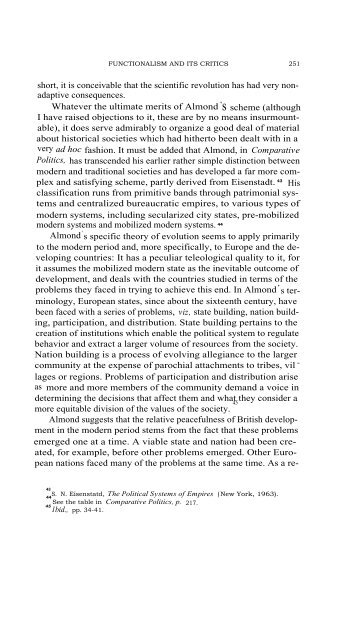FUNCTIONALISM AND ITS CRITICS - Intercollegiate Studies Institute
FUNCTIONALISM AND ITS CRITICS - Intercollegiate Studies Institute
FUNCTIONALISM AND ITS CRITICS - Intercollegiate Studies Institute
You also want an ePaper? Increase the reach of your titles
YUMPU automatically turns print PDFs into web optimized ePapers that Google loves.
<strong>FUNCTIONALISM</strong> <strong>AND</strong> <strong>ITS</strong> <strong>CRITICS</strong> 251<br />
short, it is conceivable that the scientific revolution has had very nonadaptive<br />
consequences.<br />
Whatever the ultimate merits of Almond ' s scheme (although<br />
I have raised objections to it, these are by no means insurmountable),<br />
it does serve admirably to organize a good deal of material<br />
about historical societies which had hitherto been dealt with in a<br />
very ad hoc fashion. It must be added that Almond, in Comparative<br />
Politics, has transcended his earlier rather simple distinction between<br />
modern and traditional societies and has developed a far more complex<br />
and satisfying scheme, partly derived from Eisenstadt. 43 His<br />
classification runs from primitive bands through patrimonial systems<br />
and centralized bureaucratic empires, to various types of<br />
modern systems, including secularized city states, pre-mobilized<br />
modern systems and mobilized modern systems. 44<br />
Almond ' s specific theory of evolution seems to apply primarily<br />
to the modern period and, more specifically, to Europe and the developing<br />
countries: It has a peculiar teleological quality to it, for<br />
it assumes the mobilized modern state as the inevitable outcome of<br />
development, and deals with the countries studied in terms of the<br />
problems they faced in trying to achieve this end. In Almond ' s terminology,<br />
European states, since about the sixteenth century, have<br />
been faced with a series of problems, viz, state building, nation building,<br />
participation, and distribution. State building pertains to the<br />
creation of institutions which enable the political system to regulate<br />
behavior and extract a larger volume of resources from the society.<br />
Nation building is a process of evolving allegiance to the larger<br />
community at the expense of parochial attachments to tribes, vil -<br />
lages or regions. Problems of participation and distribution arise<br />
as more and more members of the community demand a voice in<br />
determining the decisions that affect them and what they consider a<br />
more equitable division of the values of the society. 45<br />
Almond suggests that the relative peacefulness of British development<br />
in the modern period stems from the fact that these problems<br />
emerged one at a time. A viable state and nation had been created,<br />
for example, before other problems emerged. Other European<br />
nations faced many of the problems at the same time. As a re-<br />
43<br />
S. N. Eisenstatd, The Political Systems of Empires ( New York, 1963).<br />
44<br />
See the table in Comparative Politics, p. 217.<br />
45<br />
1bid., pp. 34-41.
















